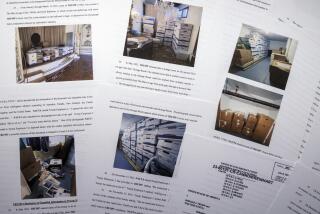Microsoft May Seek to Have Judge Removed : Litigation: The software firm says the jurist would commit misconduct in considering an anonymous charge that it threatened a competitor.
- Share via
WASHINGTON — Microsoft Corp. has warned U.S. District Judge Stanley Sporkin that it might seek to have him removed from the company’s high-stakes antitrust case if the judge considers an anonymous charge that Microsoft threatened a competitor.
The Justice Department also asked Sporkin to avoid consideration of allegations that Microsoft has used its market power to threaten or retaliate against competitors. The government argued that discussion of the document could jeopardize future probes, including a separate investigation into Microsoft’s $1.5-billion acquisition of Intuit Inc.
In a brief filed late Thursday, the world’s biggest software company argued that Sporkin would violate a judicial code of conduct if he allows into the case information from a heavily censored document sent to the court by a nameless competitor earlier this week.
The document, Microsoft said in its court filing, is “an extrajudicial source of information that the court cannot consider without risking disqualification.”
Microsoft’s legal brief is the latest shot in a months-long battle with Sporkin, a feisty federal judge who was assigned to review the terms of last summer’s much-publicized agreement between Microsoft and the Justice Department. The agreement ended a four-year federal antitrust probe.
The latest controversy surrounds a court filing earlier this week by Gary Reback, a Silicon Valley lawyer who submitted the secret document for three competing computer companies, who have submitted information to Sporkin in the case while refusing to identify themselves, out of reported fear of retaliation by Microsoft.
In the court papers, Reback said he had given the judge a censored version of a business document that supposedly outlines threats by Microsoft to dissuade another unnamed company from selling a product designed to run on a computer operating system sold by one of Microsoft’s competitors.
The court filing for the anonymous firms did not even provide the judge with the identity of the firm that had supposedly been threatened. The document provided to the judge had the name of the firm blacked out. In copies of the brief provided to Microsoft and the public, the entire document was omitted.
Microsoft responded with its own legal brief, arguing that Sporkin should not be able to consider the information.
Microsoft lawyers argue that consideration of the document, without providing it to Microsoft, would violate a judicial code stricture against private communications between judges and parties in a case. The fact that the accusers have not identified themselves also violates court rules, the company contends.
If Sporkin considers the document, Microsoft said, he could leave himself open to disqualification from the case.






